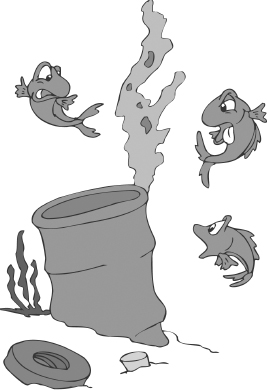
We've all had a laugh over those ridiculous, unenforced laws that are still on the books, like the ones that forbid impersonating a wolf or buying a hat without a spouse's permission. But there are a few extremely important laws still in force that are lying around unused, rusting away from neglect. One of those laws is the Refuse Act, passed in 1899 as part of the Rivers and Harbors Act.
This federal law explicitly outlaws the chucking of refuse into a navigable body of water, which includes oceans, rivers, lakes, even wetlands, as well as the tributaries that feed any of them.
The one and only kind of waste that can be disposed of in this manner is the liquid gunk that already flows through the streets and sewers. If you want to toss anything else into the drink, there's only one way to legally do it: Get written permission from the Secretary of the Army, who first must get the nod from the Army Corps of Engineers. Needless to say, if anyone ever did do this, it hasn't been done in many, many decades.
A violation is considered a misdemeanor, the punishment being imprisonment for one to six months and/or a fine of up to $25,000 for each day the pollution occurs.
In 1966, the Supreme Court upheld the Refuse Act, specifying that it applied to industrial waste in addition to any other form of refuse (besides street/sewer runoff). From that time into the early 1970s, the law was brandished against such behemoths as US Steel, DuPont, and Standard Oil.
Then the Clean Water Act became law in 1972, and the legal situation — not to mention the nation's water — got a lot murkier. While the Refuse Act outlawed all dumping sans Army permission, the Clean Water Act tried to set up reasonable amounts, varying by industry, location, type of pollutant, etc. In other words, it gave corporations a whole lot of wiggle room.
In recent years, the Refuse Act has been dusted off and used on extremely rare occasions. In 1991, Exxon pled guilty to violating several laws, including the Refuse Act, for the Valdez disaster. The next year, the EPA reports: “Pipeline rupture caused an 860,000 gallon oil spill into the Mississippi, Gasconade, and Missouri rivers. Shell pleaded guilty to violation of the Refuse Act and agreed to pay $8,400,000 in fines, restitution, and settlements.” In 1997, a small salvage company and its owner were busted under the Refuse Act and other federal laws for dumping crap into Maryland's Patapsco River.
Maybe the best part is that the statute gives a strong incentive for ordinary citizens to nail polluters. If you turn in a corporation or other entity that's fouling the water, and your information leads to a conviction under the Refuse Act, you get half of the fine levied. Even if the government won't pursue the charges, you can bring a case against the polluter in the name of the government in order to collect the dough.
The Refuse Act is still in force and has been blessed by the Supreme Court, so every discharge or dumping of waste without the Army Secretary's permission for over a century has been a federal crime. This includes everything from private boats that spew oil into a lake to broken pipelines, ruptured oil tankers, municipalities that discharge raw sewage, mines that dump fill, factory farms that dispose of animal waste, and, of course, factories and plants that toss the entire periodic table into our water.
The National Resource Defense Council noted in 2002: “Some 218 million Americans live within 10 miles of a polluted lake, river, stream or coastal area. About 45 percent of the nation's assessed waters are still unsafe for fishing, swimming or supporting aquatic life — up from 40 percent in 1998.” That's an awful lot of Refuse Act violations. 
